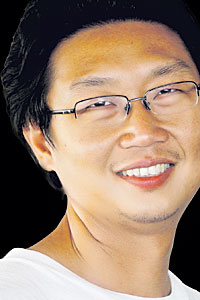Every time I get an assignment in China, old images of chaotic cities pop up in my mind. From the country's notorious images of dirty toilets where severe smells always frighten foreigners, no queuing, noisy conversations, to the hustle and bustle of narrow roads where bicycles, tricycles, motorcycles, cars, and trucks share the same route and try to criss-cross each other, for me a trip to China means language barriers and a massive culture shock.
China has such a huge population that it isn't easy to change people's behaviour. I thought that it may take a whole lifetime to see China catch up with other countries.
During recent trips to China, however, I have seen gradual transformations.
After decades of economic boom, I started noticing some developments. Basic infrastructure has been upgraded. Narrow and winding roads were replaced with a very good highway system that cuts through steep valleys and high mountains. Standard roads and railways strengthen the country's logistical efficiency. Factories and manufacturing centres of products for the world are mushrooming.
I returned to China, this time to Ningbo, a port city in the eastern part of the country, to be surprised by the remarkable changes. China, particularly in big cities, is changing at a rapid pace.
Ningbo is a tiny city. The roads have been divided into bike lanes and car lanes. Wide and clear footpaths allow pedestrians to walk freely without sharing space with vendors or parking vehicles. Leafy lanes allow pedestrians to enjoy beautiful public areas, adorned with art pieces or monuments of important persons. Street art can be found everywhere. Serenity is a part of city life.
One remarkable change I witnessed was the ban on motorcycles in the city. Now, only electric motorcycles are allowed to run in Ningbo. Shared bicycles are available on every corner of the city and it is quite popular. I can say that air quality in downtown Ningbo is better than in Bangkok's shopping districts like Pratunam or Ratchadamri.
Chinese dwellers are afraid of the word "demolished". If this word is painted on any places, it means the buildings are about to be demolished. No argument, no more negotiation. It is the state's command to replace these old buildings with new projects.
Old ugly buildings have been replaced with serene parks, gigantic museums and marvellous art galleries and theatres for the people. Of course, most of them offer free entry.
Meanwhile, some old buildings that are worth conserving are transformed into public areas or shopping districts that entertain tourists with the cosy atmosphere of the ancient city.
After seeing Ningbo, I realised that development in China is rolling faster and faster.
A strong economy and huge budget, for sure, fuel such rapid development. However, I think the most important part behind such impressive progress is the just decision to improve the city and upgrade quality of life.
You may say China can do such things because no one can go against the government. But there are several democratic countries that have managed cities beautifully too. Japan and South Korea are two obvious examples. After major wars, both countries rebuilt their cities from scratch.
All we need is a clear target and a strong intention. China is a good example of the strong will to change, no matter how difficult it is.
In Thailand, creating such change is still a challenge. If you are going to do anything that affects the poor in some way, such as turning their neighbourhood into something else, you will be blamed that you do not care about them. If your project is likely to support any private company, you will be badly criticised. Any development will be objected to or protested against by NGOs, local dwellers, anonymous critics from social networks, or someone else. I pitifully see many good plans end up dead and buried. All this must be carried out under a well-balanced plan and decision. After all, if we Thais do not change the way we work, I am sure our home will be left behind in this fast changing world.
Peerawat Jariyasombat is a travel writer of the Life section of the Bangkok Post.
